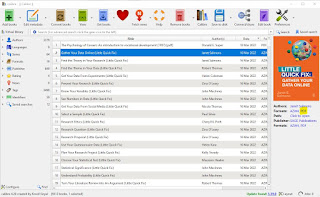I have written about the freeware ebook reader, Calibre before (read here). But I have not yet mentioned that this piece of kit can also convert our ebook formats from ePub or mobi to pdf files. However, Calibre's default settings don't provide a tidy result: for example, the margins are set to be too narrow; the page format way too short, and the font size is too large. A few tweaks, as advised by Rohde (2015) below, will give us a much more readable result.
The instructions are (Rohde, 2015):
- Open Calibre and select the file
- Right click, select Convert Books | Convert Individually

- Change the output to PDF on the top right corner of the screen. Go to ‘Page Setup’ tab and change all margins to 75 pt
- Go to ‘PDF Output’ and set the following settings
Now we simply click "OK", and we are done. Click on pdf under the format for the file type in the right-hand detail side bar to open our brand new pdf.
Thanks to Max Rohde for the tip!
Sam
References:
Rohde, M. (28 January 2015). Rendering Beautiful PDF Documents with Calibre. https://maxrohde.com/2015/01/28/rendering-beautiful-pdf-documents-with-calibre/





